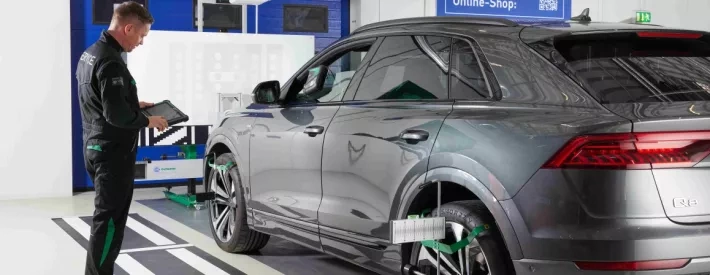Why Hella is putting ADAS at the heart of its new academy (and more need to)

There’s sea-change occurring in the industry, as more vehicles integrate advanced driver assistance systems (ADAS). EU regulation mandated that all vehicles produced from July 2022 onward should incorporate several safety components, including Level 2 autonomy such as lane centring and adaptive cruise control. That led to the IMI forecasting that 44% of the UK car parc will have Level 2 autonomy by 2030. It’s a significant change to the sector.
But ADAS trained technicians isn’t accelerating. Today 12% of UK cars have some degree of level 2 autonomy, yet only 2% of technicians are ADAS qualified. That’s just 4,150 people.
As the number of ADAS-equipped vehicles grows, organisations are embracing the importance of delivering the skills needed to work on them. And as the data suggests, the number of centres offering ADAS courses and qualifications and automotive workers taking them up is critical to the sector’s success.
Investing in ADAS
Hella’s brand new training facility Hella Academy was officially opened in April and formally received IMI approval.
Based in Oxfordshire, the academy mixes classroom and workshop to create the right balance of desk learning and hands-on experience, and ADAS skills have been placed front and centre.
Hella Managing Director Neil Grant said: “The opening of Hella Academy is the beginning of an exciting new chapter. While bodyshops in the crash repair sector already understand being ADAS-capable is a must, many garages are still catching up. Through the training we will deliver, they will be able to seize the ADAS opportunity.”
With the number of vehicles on the road with a suite of integrated sensors, including cameras, radar and ultrasonic sensors, and with lidar systems coming online, it’s increasingly important that technicians understand how to work with the technologies. And it’s why training centres such as the Hella Academy are important.
Steve Fox, Training Manager at HELLA Academy: “Much work has gone into putting together this brand-new training centre. We can now work to support the sector up-skill, with the initial focus on advanced driver assistance systems.”
Hella is obviously well placed to deliver ADAS training as tools supplier, and it’s something it can leverage as learners come through the academy.
During the academy’s opening Fox went showed how Hella Gutmann’s CSC-Tool Digital provides a flexible solution for front camera and sensor calibration, with targets downloaded from the CSC-Tool Digital App and displayed on an integrated 200cm screen.
“We already provide the tools,” said Julian Goulding, Head of Sales at Hella Gutmann, “but with the opening of [the] Hella Academy, we are able to provide even wider backing for the garage sector in terms of training and development. As a result, independent garages will truly be able to make the most of ADAS.”
What skills are needed
A lot of the knowledge needed to work on ADAS-equipped cars is already out there. But understanding how wheel choice, for example, can impact on the calibration of ADAS systems is critical. And then there are the additional skills requirements.
The knowledge to work safely while carrying out diagnostic, testing and repair activities on ADAS sensors and systems is varied, including understanding how systems operate as well as vehicle system requirements on the completion of vehicle repairs. As well as diagnosing, removing, replacing and recalibrating ADAS systems and components.
All of it is achievable, and it means those passing through the training courses will have a greater skillset to call on, making them and their businesses more successful. The challenge now is understanding that the market is growing, and more centres and people need to prepare for an ADAS future.




